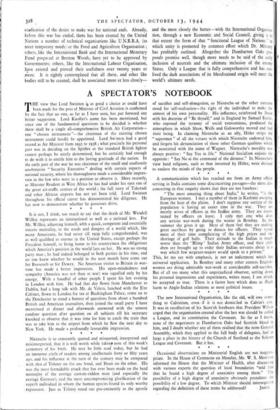It is not, I think, too much to say that
the death of Mr. Wendell Willkie represents an international as well as a national loss. For Mr. Willkie, adjusting himself, with a quick, competent and essentially sincere mentality, to the needs and dangers of a world which, like many Americans, he had never till 1939 fully comprehended, was as well qualified as anyone in the United States, except perhaps the President himself, to bring home to his countrymen the obligations which America's position in the world lays on her. He was no strong party man ; he had indeed belonged to both parties in his time, and no one knew whether he would in the next month have come out for Roosevelt or for Dewey. No American visitor to Britain in war- time has made a better impression. His open-mindedness and sympathy (America was not then at war) was equalled only by his energy. With a handful of other people I spent his last evening in London with him. He had that day flown from Manchester to Dublin, had a long talk with Mr. de Valera, lunched with the Eire Cabinet, flown to London, for tea at Buckingham Palace, come on to the Dorchester to stand a battery of questions from about a hundred British and American journalists, then joined the small party I have mentioned at dinner and afterwards answered with the utmost candour question after question on all subjects till his secretary knocked to observe that it was time for him to catch the train that was to take him to the airport from which he flew the next day to New York. He made a profoundly favourable impression.


























 Previous page
Previous page